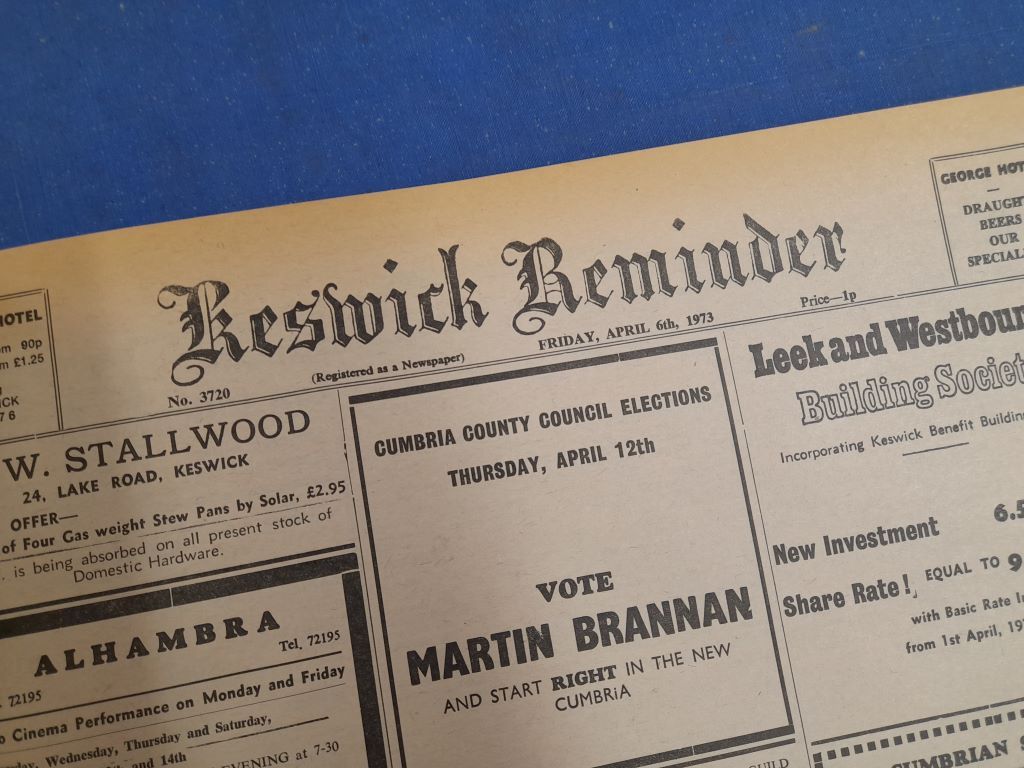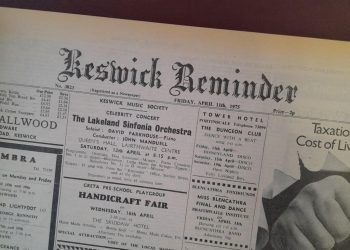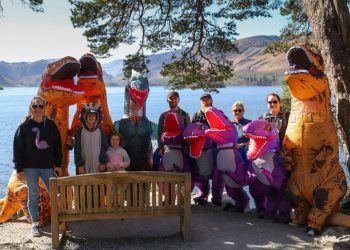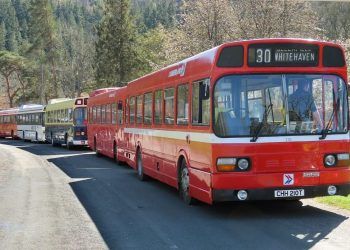
Looking back through the archives of The Keswick Reminder from around this week 20, 30, 40 and 50 years ago.
20 years ago
Keswick park peaks in top web award
The family and staff of a top North Cumbria holiday park are celebrating their victory in one of UK tourism’s most prestigious website design competitions.
Castlerigg Hall Camping and Caravan Park at Keswick has beaten hundreds of contenders to take first place in the industry’s annual search for the best park website in Britain. The judges declared that Castlerigg Hall’s website had all the hallmarks of a top professional design — even though it was created entirely by the owner, David Jackson, on his office computer.
Castlerigg Hall began to be developed as a park in the mid-1950s by David’s farming parents, and at first was little more than a small camping field providing just a tap and an old earth toilet for guests.
But holidaymakers were also rewarded by some of the Lake District’s most spectacular views, and the park’s popularity allowed the family to begin investing in more up-to-date facilities.
Today the park has a four-star quality rating from the Tourist Board. and has been chosen by Professor David Bellamy to receive a special conservation award for its environmental achievements. As well as camping facilities, the park provides luxury caravan holiday homes for rent and for sale, plus a shop, café, and now thoroughly modern toilet and showering buildings.
Views from the park taken by David feature on Castlerigg Hall’s award-winning website, but according to the competition judges, the beauty of the site is much more than pixel-deep. It had, they commented, an unmistakably friendly and welcoming atmosphere, with a sparing but effective use of technology which made it smart, slick and thoroughly professional in appearance.
30 years ago
Appeal refused
An appeal by two young people who, it has been claimed, are “typical examples of local people unable to afford a home due to high house prices in the National Park has been refused by an inspector appointed by the Department of the Environment.
The Inspector dismissed the appeal against refusal by the Lake District Special Planning Board to allow a bungalow and garage at the southern end of Robin Hood Wood.
The Inspector said the bungalow would be conspicuous not only from nearby, but from parts of the village and it would, he considered, significantly detract from the appearance of the landscape.
The Inspector said he accepted that the Lake District National Park was an area where exceptions could be expected to be made from time to time, but he believed the degree of harm to the setting of Bassenthwaite outweighed the benefit that would arise from enabling two local people to build a bungalow they could afford.
He said: “I do not doubt the difficulties facing the appellants in finding affordable housing. Theirs is a real problem with which I sympathise.”
40 years ago
Easter trade
Keswick shopkeepers have come to regard Easter as one of the main financial successes of the year, but last week-end’s signs pointed to a marked decline in trade. Although the town was jammed with people and cars, business failed to hit levels achieved in past years.
One gift shop owner commented : “There were plenty of folk about, but they don’t appear to have the money to spend anymore.”
In general terms it was one of Keswick’s calmest Easters for some time. Police reported that the town had been relatively quiet from a public order point of view, although a spokesman said the influx of vehicles had caused congestion.
A Publicity Association official said that Good Friday was one of the quietest on record. However the pace of the holiday picked up on Saturday and Sunday when all the accommodation on offer was snapped up.
The majority of the visitors were seeking cheaper forms of accommodation on caravan and camp sites, or through self catering.
Mrs. Jean Airey, secretary of the Publicity Association’s information office at the Moot Hall, said: “The trend has definitely been down market this Easter. People have been looking for accommodation around the £5 mark which is non-existent.’
She added : “One encouraging aspect was that Keswick was really buzzing on Tuesday. Quite a lot of people obviously decided to come back after the main body of visitors had gone.”
Some town centre restaurants had reported business as only “moderate” over-the holiday.
50 years ago
Swimming Pool
After many hours of negotiation, argument and deliberation over the last few years, the plan to provide Keswick with an indoor swimming pool was finally abandoned on Tuesday evening at a public meeting at which it was agreed that the £871 remaining in the fund should be given to the Derwentwater Bathing Club.
When the original plan to finance an indoor heated pool from a souvenir land sales scheme failed, the Committee turned, nearly three years ago, to negotiations with the County Council over the provision of a pool at Lairthwaite School but these also proved fruitless. They were outlined by Mr. Branthwaite in a report in which he said that such a pool, built to county specifications, would cost £20,000. They had been offered a grant of £3,379 by the county and a loan of £2,000, but the latter would have to be paid back over five years at 7% and the Committee finally decided that there was no alternative to abandoning the venture when, earlier this year, they were turned down in their application for a grant from the Sports Council.
Various views were put forward during the meeting including criticism of the County Council; criticism of the Urban Council because they had only offered £500; criticism of the Committee for having chosen the Lairthwaite option and not having done enough in the way of money raising; and criticism of people earning money from tourism who do nothing to help provide necessary facilities. There were no offers put forward, however, of a means of providing the money or the facilities and the meeting had to decide how to dispose of the funds left.
Some confusion arose over a letter from Mr. G. S. Bessey, Director of Education, implying that the County Council would not foot the full cost of building a pool at the new Trinity Junior School to replace the Crosthwaite Pool, but Mr, B. H, Wilkinson, Headmaster of Crosthwaite School, and Mrs. B. M. Robinson, a member of the Western Area Education Sub-Committee, were of the opinion that the County had agreed to foot the bill.
The two alternative schemes on which the Committee were asked to spend the remaining funds were on the enhancement of the Trinity School pool by turning it into an indoor pool or the Derwentwater
Bathing Club which has the offer of a 49% grant towards the £2,250 needed to build new accommodation at the lakeshore, The meeting declined to split the money between the two as suggested by Dr. T. Donaldson and it eventually agreed to give it the Derwentwater Bathing Club.
Mr. Jordan thanked Mr. Branthwaite for his considerable work on the project and said it would not be considered that he had failed but that he had proved “it could not be done.”








